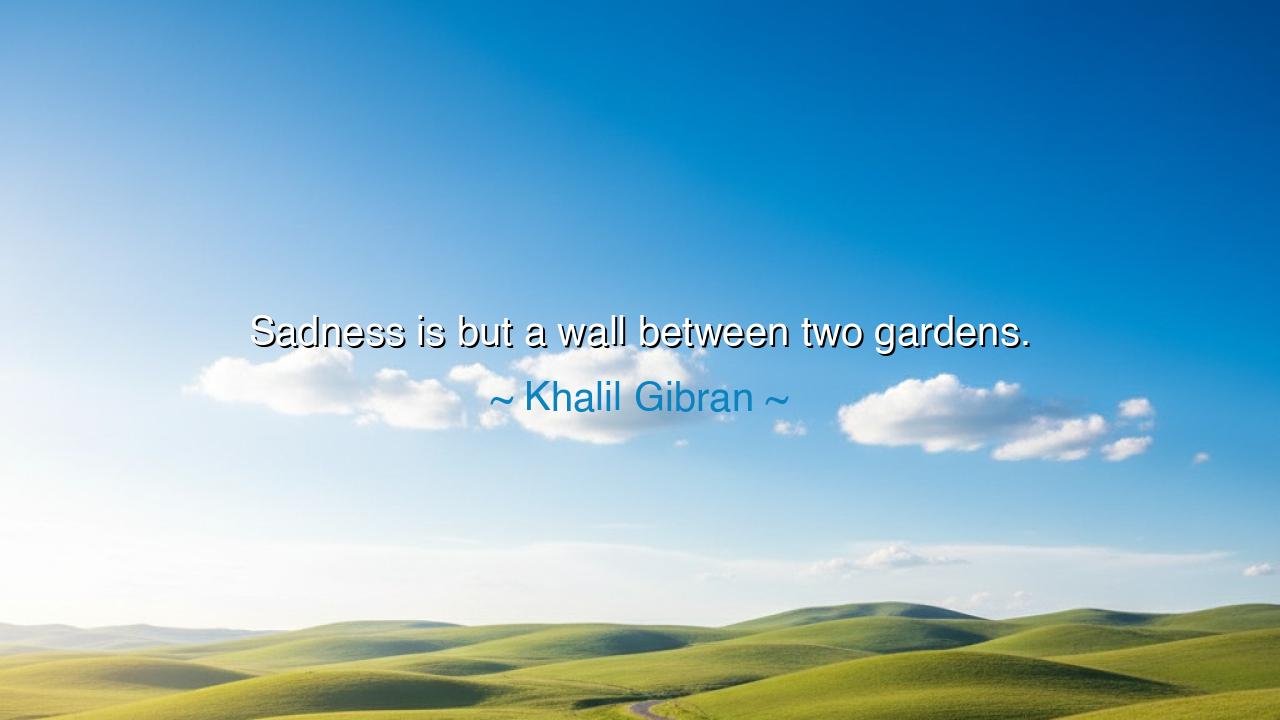
Sadness is but a wall between two gardens.






“Sadness is but a wall between two gardens.” — thus wrote Khalil Gibran, the poet of Lebanon whose words carry the fragrance of eternity. In this single line, he unfolds the mystery of sorrow and renewal — the truth that sadness is not an end, but a passage, not a curse, but a quiet space between two moments of blooming. He does not deny pain, nor does he romanticize it; instead, he reveals its sacred purpose. For between every joy that fades and every joy yet to come, there lies a wall of sorrow, a stillness where the heart must pause, reflect, and be remade.
In the wisdom of the ancients, this idea resounds like a familiar song. The sages knew that all of life moves in cycles — from birth to death, from winter to spring, from darkness to dawn. They taught that sorrow and happiness are not opposites, but companions on the same road. Just as the night shelters the promise of sunrise, so too does sadness conceal the seed of renewal. When Gibran calls sadness a “wall,” he reminds us that it may obstruct our view, but it cannot erase what lies beyond. On one side of that wall is the garden we once knew — filled with laughter, love, and innocence — and on the other waits the garden we have not yet entered, where we will grow wiser and stronger through our grief.
In this image, Gibran transforms sorrow into a teacher. For the wall of sadness is not meant to imprison us, but to give us time — time to heal, to shed what no longer serves us, to rest before the next flowering of the soul. The soil of the spirit must sometimes lie fallow so that new life may take root. Many fear their sadness, mistaking it for failure or despair. But those who have walked deeply through grief know that the heart that has wept becomes more tender, more compassionate. Sadness refines the soul, scraping away the excess of pride and illusion, leaving behind only what is true.
Consider the story of Helen Keller, who was struck blind and deaf at a tender age. Her early years were filled with frustration — the dark, soundless wall of her own sadness separating her from the world. Yet it was within that silence, that unseen wall, that her spirit learned to reach beyond itself. With the patient guidance of her teacher, Anne Sullivan, Keller discovered language, knowledge, and light — the second garden beyond her sorrow. Her life became a testament to Gibran’s truth: that what seems to be the end of joy is often the beginning of understanding.
Gibran himself knew this path intimately. Torn from his homeland of Lebanon, exiled to a strange country, he carried the ache of separation within his heart. Yet from that ache bloomed his greatest works — The Prophet, The Broken Wings, and many poems that taught the world to see beauty in loss. His sadness became the bridge between his past and his destiny. When he wrote of the two gardens, he was speaking not as a philosopher, but as one who had walked through the wilderness of longing and found grace on the other side. His wall of sadness became a window through which the world could see the divine.
In this way, Gibran calls us to courage. He teaches that to despair is to mistake the wall for the world, to think that sadness is all there is. But if we endure with faith, we will find that even sorrow has purpose. When grief feels heavy and endless, we must remember that behind the wall, another garden is already growing — unseen, but alive. Its flowers are being nourished by the rain of our tears. And when the season turns, we will walk once more among blossoms, carrying the wisdom our sorrow gave us.
So, my child, when sadness comes, do not curse it. Do not strike your fists against the wall, nor try to flee from it in fear. Sit quietly before it. Feel its cool surface. Let it teach you patience, humility, and strength. Know that beyond it lies another garden — of peace, of laughter, of love renewed. The wall will not last forever; it is only the breath between endings and beginnings. For as Khalil Gibran reminds us, sadness is but a shadow that stands between the sunlight of two springs — and when the heart has rested in its darkness, it will bloom again, brighter than before.






AAdministratorAdministrator
Welcome, honored guests. Please leave a comment, we will respond soon